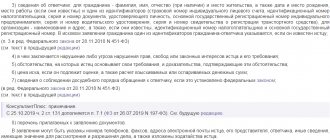The housing inspector may not like unilateral termination of the contract
The Arbitration Court of the West Siberian District decided that the State Housing Inspectorate cannot arbitrarily refuse to make changes to the register of licenses. If, when considering the application of the Criminal Code, the inspection finds signs of the nullity of the decision of the general meeting, this is a basis for challenging the decision in court, and not for refusing to make changes to the register of licenses (case No. A27 - 21529/2020).
At an extraordinary general meeting, the owners from Novokuznetsk terminated the management agreement with the management organization and concluded it with a new management company. The new management company posted information about the management of apartment buildings on the website of the GIS Housing and Communal Services and sent applications to the State Housing Inspectorate of Kuzbass to amend the register of licenses to include information about the management of apartment buildings.
The inspectorate refused to make changes to the register of licenses, considering that the unilateral refusal of the owners did not comply with Part 8.2 of Art. 162 Housing Code of the Russian Federation. The Criminal Code appealed the refusal in court.
The courts of first and appellate instances upheld the claim. They concluded that the refusal does not comply with the law and violates the rights and legitimate interests of society. The supervisory authority did not agree with the court decisions and appealed them.
The Arbitration Court of the West Siberian District supported the Criminal Code. The inspectorate refused to include the management company’s data in the register, citing the fact that the management company’s documents do not comply with the requirements of subparagraph “e” of paragraph 5 of the Procedure and deadlines for making changes to the register of licenses of an entity (Order of the Ministry of Construction No. 938/pr), having seen in the documents signs of the nullity of the decision of the general meeting , since “the decision made by the owners, in particular, to terminate the management contract with the previous management company, contradicts the fundamentals of the rule of law.”
Refuting this argument, the court noted:
- contrary to the conclusion of the inspectorate, violations when the general meeting made decisions on the choice of a management organization can serve as a basis for challenging such a decision in court and does not apply to the absolute grounds for its nullity;
- owners have the right to unilaterally refuse the management agreement if the management company does not fulfill its obligations;
- The owners' decision to choose a management company was not challenged.
Taking into account these circumstances, the courts rightly declared the inspectorate’s decision invalid and imposed on the defendant the obligation to eliminate the violation of the rights and legitimate interests of the management company by re-examining the company’s application.
Arbitrage practice
Despite the fact that today there are quite a lot of terminations of service contracts for apartment buildings, including using the unilateral mechanism, judicial practice on this kind of civil claims is not so extensive and boils down mainly to challenging the decision of the meeting of owners of an apartment building to termination of the management contract. Challenging can be carried out in the form of a claim filed either by the management company itself or by other owners of the premises who disagree with the decision.
On May 16, 2021, the Novgorod District Court of the Novgorod Region issued a decision in a lawsuit in which a management company, which is also the owner of one of the premises in this building, tried to challenge the decision of an extraordinary meeting of owners of premises in an apartment building. At the meeting, the results of which were subject to challenge at the court hearing, it was decided to refuse the services of the plaintiff management company and enter into a management agreement with another management organization. The representative of the plaintiff, as the basis for bringing forward the claim, indicated that during the meeting, the provisions of the Housing Code were grossly violated in the context of the use of the norms of this Code on holding a meeting of owners of premises in an apartment building and unilaterally terminating the management agreement of an apartment building. In particular, according to the plaintiff, the rules for holding the meeting, the procedure for processing voting results and voting ballots were not observed (the latter were issued in violation of legal requirements, according to the plaintiff).
When considering the claim and all the materials presented on it, the court did not find any violations of the current legislation, since according to all the minutes of the meeting and voting, the quorum was fully observed, and the results were formalized in proper form using the final protocol, copies of which were posted at all entrances to specialized information boards, which indicates that all residents are fully informed about the voting results. Based on the data examined within the framework of the claim proceedings, the court decided to refuse to satisfy the claims, since no violations of the law pointed out by the plaintiff were established.
The management company does not agree with the unilateral termination of the contract
The Eighth Court of Cassation of General Jurisdiction considered the dispute concerning the unilateral termination of the contract between the management company and the owners of the premises (case No. 88 – 13432/2021). The cassation instance considered the issue of the owners’ right to unilaterally refuse the management agreement and what grounds are necessary for this.
In this case, the Raduga Management Company learned from a message from the State Housing Inspectorate of the Kemerovo Region that it had received the minutes of the general meeting with a decision to terminate the management agreement with the Raduga Management Company and conclude a management agreement with the Severnaya Management Company. At the same time, the notice of termination of the contract and the minutes of the general meeting were not received by the Raduga Management Company.
Management Company "Raduga" did not agree with the decision to terminate the management contract and appealed it in court. In the lawsuit, the management company referred to the illegality of the early termination of the contract by the owners, since the management company did not allow significant violations of the terms of the management agreement.
The courts of first and second instance rejected the claim. Based on the complaint of the Criminal Code, the case was considered by the Eighth Court of Cassation of General Jurisdiction.
The cassation court noted that the Criminal Code has the right to challenge the insignificance of the general meeting. However, the Criminal Code substantiated its demands not by the flaw in the decision of the general meeting, but by the fact that the defendant and other owners have no grounds for unilateral refusal of the apartment management agreement.
The court referred to the following norms of the Housing Code of the Russian Federation: - changes and (or) termination of the management agreement for an apartment building are carried out in the manner prescribed by civil legislation (Part 8 of Article 162); - the owners of premises in an apartment building, on the basis of a decision of the general meeting, have the right to unilaterally refuse to fulfill the management agreement for an apartment building if the management organization does not comply with the terms of such an agreement, and decide to choose another management organization or to change the method of managing this house (Part 8.2 of the article 162 Housing Code of the Russian Federation).
The court found that many owners were dissatisfied with the service provided by the plaintiff: the entrances were not cleaned, the grass on the site was not cut until July, and the roof was not repaired. The shortcomings in the execution of the contract are also recognized by the company itself, which indicated that the appeals and complaints of citizens themselves cannot indicate the failure of the management company to fulfill the terms of the management contract.
Having analyzed the totality of civil law and housing law, the court noted:
- Having once chosen an organization to provide services for the maintenance and current repairs of the common property of apartment buildings, the owners of the premises are not deprived of the opportunity to terminate the relevant contract, including through unilateral refusal.
- The law provides that an independent condition for termination of an agreement may be failure to comply with the terms of such an agreement of the Criminal Code.
- Contrary to the arguments of the cassation appeal, the law did not establish a criterion for the materiality of the violation for such a refusal. On the contrary, given that one of the parties to the contract, as a rule, are individuals, the current legal regulation reduces the standard of requirements for violations that may serve as grounds for termination of the management contract for an apartment building.
- The absence of acts of violation of quality or exceeding the established duration of a break in the provision of services or performance of work cannot deprive the owner of premises in an apartment building of the right to unilaterally withdraw from the contract, given that the law does not impose requirements for means of proof that can confirm violations committed by the management company.
The Cassation Board upheld the judicial decisions.
Can a management company terminate a contract unilaterally and what is it?
The Civil Code of the Russian Federation, which considers various possibilities for terminating property management contracts in an apartment building, in particular, a service contract, states that any of the parties participating in the contract has the right to terminate it at its own discretion at any time by drawing up an appropriate additional agreement or unilaterally through the use of a judicial mechanism, if we are talking about repeated failure to fulfill obligations that are provided for the other party.
Based on such positions of the legislator specified in the Civil Code, as well as the provisions of the Housing Code of the Russian Federation, the management company has the right to exercise its right to terminate the property management agreement of an apartment building unilaterally.
However, this will require fairly compelling reasons that can prove not only that the maintenance of a particular house is unprofitable for the management organization (if we are talking only about the unprofitability of the service, then termination of the management contract will be considered illegal), but also the failure to properly perform on the part of the owners of the premises in apartment building the obligations assigned to them under the contract. In order for a failure to fulfill obligations to be recognized as truly existing, the contract must not be properly fulfilled by at least twenty-five percent of the owners of premises in an apartment building , if we are talking about failure to fulfill any one condition, and at least fifty-one percent, if we are talking about violations several terms of the contract (the total number of violators is summed up)
The management company will not be able to terminate the contract by simply refusing to fulfill its obligations (except when it comes to fixing such a mechanism in the text of the contract itself).
In order for unilateral termination of a contract at the initiative of the management organization to be recognized as legal, a special court decision must be made. Otherwise, penalties may be imposed on the management organization, and the license to provide a certain type of service may be revoked in accordance with the provisions of the Housing Code of the Russian Federation.
Article 162. Management agreement for an apartment building
. An apartment building management agreement is concluded with a management organization that has been granted a license to carry out activities for managing apartment buildings in accordance with the requirements of this Code, in writing or electronically using the system by drawing up one document signed by the parties. When choosing a management organization by a general meeting of owners of premises in an apartment building, a management agreement is concluded with each owner of premises in such a building on the terms specified in the decision of this general meeting. In this case, the owners of premises in this building, having more than fifty percent of the votes of the total number of votes of the owners of premises in this building, act as one party to the concluded agreement. Each owner of premises in an apartment building independently fulfills the obligations under the management agreement for the apartment building, including the obligation to pay for residential premises and utilities, and is not responsible for the obligations of other owners of premises in this building.
1.1. In the case provided for in Part 13 of Article 161 of this Code, with each person who has accepted from the developer (the person providing the construction of an apartment building) after issuing permission to put an apartment building into operation, premises in this building under a transfer deed or other transfer document shall be concluded management agreement for an apartment building. Moreover, such persons act as one party to the concluded agreement if they constitute more than fifty percent of their total number.
. Under an agreement for the management of an apartment building, one party (the management organization) on the instructions of the other party (the owners of the premises in the apartment building, the management bodies of the homeowners' association, the management bodies of a housing cooperative or the management bodies of another specialized consumer cooperative, the person specified in paragraph 6 of part 2 of Article 153 of this Code, or in the case provided for in Part 14 of Article 161 of this Code, the developer) within an agreed period for a fee undertakes to perform work and (or) provide services for the management of an apartment building, provide services and perform work on the proper maintenance and repair of common property in such a house, provide utility services to the owners of premises in such a house and persons using the premises in this house, or in cases provided for in Article 157.2 of this Code, ensure the readiness of engineering systems, and carry out other activities aimed at achieving the goals of managing an apartment building.
2.1. The management agreement for an apartment building, concluded in the manner established by this article, must be placed by the management organization in the system in the manner established by the federal executive body exercising the functions of developing and implementing state policy and legal regulation in the field of information technology, together with the federal an executive body that carries out the functions of developing and implementing state policy and legal regulation in the field of housing and communal services.
. The management agreement for an apartment building must indicate:
- 1) the composition of the common property of the apartment building in respect of which management will be carried out, and the address of such a building;
- 2) a list of works and (or) services for the management of an apartment building, services and works for the maintenance and repair of common property in an apartment building, the procedure for changing such a list, as well as a list of utilities provided by the management organization, with the exception of utility services provided in in accordance with Article 157.2 of this Code;
- 3) the procedure for determining the price of the contract, the amount of payment for the maintenance and repair of residential premises and the amount of payment for utility services, as well as the procedure for making such payment, with the exception of payment for utility services provided in accordance with Article 157.2 of this Code;
- 4) the procedure for monitoring the management organization’s fulfillment of its obligations under the management agreement.
. The terms of the management agreement for an apartment building are established the same for all owners of premises in the apartment building.
. The management agreement for an apartment building is concluded:
- 1) in the case specified in part 1 of this article, for a period of not less than one year, but not more than five years;
- 2) in the cases specified in parts 4 and 13 of Article 161 of this Code, for a period of no less than one year, but not more than three years;
- 3) in the case specified in Part 14 of Article 161 of this Code, for a period of no more than three months.
. In the absence of an application from one of the parties to terminate the management agreement for an apartment building at the end of its validity period, such an agreement is considered extended for the same period and on the same conditions as provided for in such an agreement.
. The management organization is obliged to begin executing the management agreement for an apartment building from the date of making changes to the register of licenses of a constituent entity of the Russian Federation in connection with the conclusion of a management agreement for such a building.
. Changes and (or) termination of the management agreement for an apartment building are carried out in the manner prescribed by civil law.
8.1. Owners of premises in an apartment building unilaterally have the right to refuse to execute an agreement for the management of an apartment building, concluded as a result of an open competition provided for in parts 4 and 13 of Article 161 of this Code, after each subsequent year from the date of conclusion of the said agreement if, before the expiration of the term validity of such an agreement, the general meeting of owners of premises in an apartment building made a decision to choose or change the method of managing this building.
8.2. Owners of premises in an apartment building, on the basis of a decision of the general meeting of owners of premises in an apartment building, unilaterally have the right to refuse to fulfill the management agreement for an apartment building if the management organization does not comply with the terms of such agreement, and decide to select another management organization or change the method of managing this home.
. Management of an apartment building, which is owned by a housing cooperative or in which a homeowners' association has been created, is carried out taking into account the provisions of sections V and VI of this Code.
. The management organization, within three working days from the date of termination of the management agreement for an apartment building, is obliged to transfer technical documentation for the apartment building and other documents related to the management of such a building, keys to the premises that are part of the common property of the owners of premises in the apartment building, electronic access codes for equipment , which is part of the common property of the owners of premises in an apartment building, and other technical means and equipment necessary for the operation and management of an apartment building, a newly selected management organization, a homeowners' association or a housing or housing-construction cooperative or other specialized consumer cooperative, and in the case of direct management of such a house by the owners of the premises in such a house, to one of these owners indicated in the decision of the general meeting of these owners on the choice of the method of managing such a house, or, if this owner is not specified, to any owner of the premises in such a house.
. Unless otherwise established by the management agreement for an apartment building, the management organization annually, during the first quarter of the current year, submits to the owners of premises in the apartment building a report on the implementation of the management agreement for the previous year, and also places the specified report in the system.
. If, based on the results of the execution of the management agreement for an apartment building in accordance with the report on the implementation of the management agreement posted in the system, the actual expenses of the management organization turned out to be less than those that were taken into account when establishing the amount of payment for the maintenance of residential premises, subject to the provision of services and (or) performance of management work apartment building, provision of services and (or) performance of work on the maintenance and repair of common property in an apartment building, provided for by such an agreement, the specified difference remains at the disposal of the management organization, provided that the savings received by the management organization did not lead to inadequate quality of services provided and (or ) work performed on the management of an apartment building, services provided and (or) work performed on the maintenance and repair of common property in an apartment building, provided for by such an agreement, confirmed in the manner established by the Government of the Russian Federation. In this case, the management agreement for an apartment building may provide for a different distribution of the savings received by the management organization.






